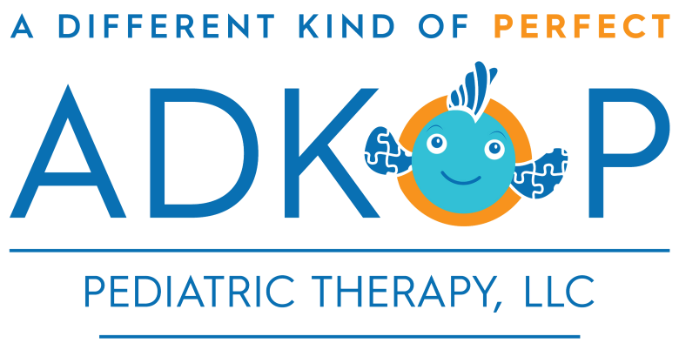Pediatric occupational therapy focuses on developing and enhancing a child’s daily living skills in order to reach his or her highest level of independence. Unfortunately, countless children experience problems that significantly affect their ability to manage their daily lives. Whether it’s the inability to perform common tasks or progress normally through the stages of social or cognitive development, occupational therapy can help improve a child’s cognitive, physical, sensory, and motor skills, and enhance their self-esteem and sense of accomplishment.
Through meaningful therapeutic activities, A Different Kind of Perfect works to meet each child’s unique needs in the comfort of their own environment. If, however, skill and strength cannot be developed or improved, we offer creative solutions and resources for carrying out the child’s daily activities that are designed specifically for them. Those who may benefit from pediatric occupational therapy include children whose lives have been affected by birth injury, developmental delay, accident, illness or sensory processing disorder.

FINE MOTOR SKILLS HANDWRITING
Fine motor skills as well as handwriting skills involve small muscle movements of the hands for activities such as picking up cereal, holding a pencil or a crayon, stringing beads, picking up small toys, and tying shoes. Many fine motor tasks require foundational building blocks of strength, in-hand manipulation skills, and appropriate grasp patterns.

HELP SKILLS ACTIVITIES OF DAILY LIFE
Self-help skills include mealtime/eating, brushing teeth, sleep/wake cycles, getting dressed, adjusting zippers and fasteners, manipulating buttons, tying shoes, and performing chores. There are many underlying reasons why a child may have difficulties with activities of daily living. Treatment strategies will address the underlying deficit as well as the skill itself.

DYSLEXIA
Dyslexia is a lifelong condition that makes it difficult for children to read and translate the tasked reading to writing. Dyslexia is mainly a problem with reading accurately and fluently. Kids with dyslexia may have trouble answering questions about something they’ve read. But when it’s read to them, they may have no difficulty at all. We will provide many tests that can determine what of assistance and therapy your child may need. Early invention for dyslexia is highly recommended for children at the school aged level.

VISUAL PERCEPTION SKILLS
Visual perceptual skills are needed to understand or give meaning to what we see. We use visual perceptual skills to perform everyday activities such as putting puzzles together, finding objects in a toy chest or junk drawers, deciphering worksheets, copying from the board, art, reading, writing, and math.

SOCIAL & PRAGMATIC SKILLS
Children can have difficulty with peer interactions in various social environments including school, extracurricular activities and play dates. Such difficulties may include turn taking, manners, cooperation, initiating conversation, making friends, voice volume/speed, eye contact, and solving problems. Other areas that can impact a child’s social skills include difficulties with sensory processing, decreased motor planning skills, decreased gross and fine motor skills, decreased coping skills, and decreased self esteem
